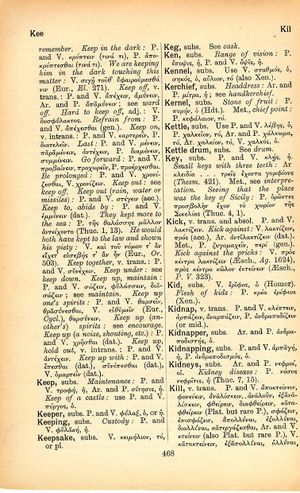kill
νεκρὸν ἐάν ποτ' ἴδηις καὶ μνήματα κωφὰ παράγηις κοινὸν ἔσοπτρον ὁρᾶις· ὁ θανὼν οὕτως προσεδόκα → whenever you see a body dead, or pass by silent tombs, you look into the mirror of all men's destiny: the dead man expected nothing else | if you ever see a corpse or walk by quiet graves, that's when you look into the mirror we all share: the dead expected this
English > Greek (Woodhouse)
v. trans.
P. and V. ἀποκτείνειν, φονεύειν, ἀναλίσκειν, ἀναλοῦν, ἐξαναλίσκειν, φθείρειν, διαφθείρειν, καταφθείρειν (Plat. but rare P.), σφάζειν, ἐπισφάζειν, ἀπολλύναι, ἐξολλύναι, διολλύναι, κατεργάζεσθαι, Ar. and V. κτείνειν (also Plat. but rare P.), V. κατακτείνειν, ἐξαπολλύναι, ὀλλύναι, διαπράσσειν, ἐκπράσσειν, διεργάζεσθαι, ἐξεργάζεσθαι, κατασφάζειν, καταφονεύειν, καίνειν (also. Xen.), ἐναίρειν, ἐναρίζειν, νοσφίσαι (1st aor. νοσφίζειν), αἱρεῖν (Eur., Hec. 886), Ar. and P. ἀποσφάζειν, P. ἀποκτιννύναι, διαχρῆσθαι; see destroy. Killed: see dead, fallen. Be killed: Ar. and P. ἀποθνήσκειν, V. θνήσκειν (rare Ar.); die. Kill in return: P. and V. ἀνταποκτείνειν, V. ἀνταναλίσκειν. Help in killing: V. συμφονεύειν, συγκατακτείνειν. Kill with othere: V. συμφονεύειν (acc. and dat.). Be killed with others: V. συσφαγῆναι (dat.) (2nd aor. pass. συσφάζειν).

